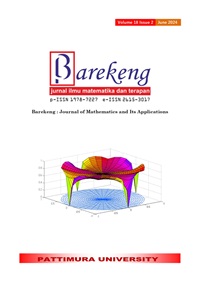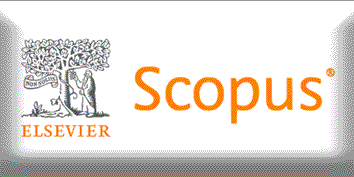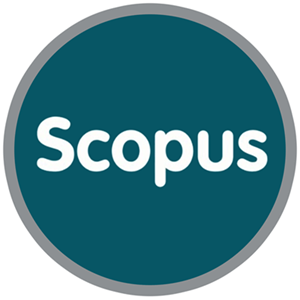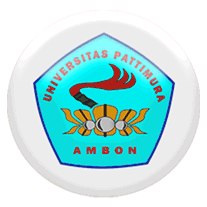ANALYSIS OF THE RELATIONSHIP BETWEEN FACTORS THAT INFLUENCE USER SATISFACTION IN GOJEK USING THE FUZZY DEMATEL METHOD
Abstract
Gojek is one of the most popular online transportation services in Indonesia. The success of Gojek is closely tied to user satisfaction. There are five factors influencing user satisfaction: service quality factor (A), price factor (B), ease of use factor (C), perceived benefit factor (D), and online servicescape factor (E). This research aims to identify which factors most significantly affect user satisfaction with Gojek services among students of the Mathematics Department at UNP. This study in applied research that is described using fuzzy DEMATEL and employs primary data obtained from questionnaire responses. The population of this study consists of students from the Mathematics Department at FMIPA UNP who enrolled in 2022, with a sample size of 75 students using the proportional random sampling technique. The results of this research indicate a significant relationship between the service quality factor (A) and price factor (B). With respective y coordinates of 0.583 and 2.074, the researcher can conclude that the price factor has the most significant influence on user satisfaction with Gojek among students of the Mathematics Department at FMIPA UNP in the 2022 cohort.
Downloads
References
R. Tumuwe, M. Damis, and T. Mulianti, “PENGGUNA OJEK ONLINE DI KALANGAN MAHASISWA UNIVERSITAS SAM RATULANGI MANADO,” 2018. [Online]. Available: www.GoJek.com
A. R. Resusun, A. L. Tumbel, and Y. Mandagie, “ANALISIS PERBANDINGAN KUALITAS PELAYANAN TERHADAP KEPUASAN KONSUMEN PENGGUNA TRANSPORTASI ONLINE GOJEK DAN GRAB PADA MAHASISWA FAKULTAS TEKNIK MESIN UNSRAT COMPARATIVE ANALYSIS OF THE QUALITY OF SERVICE TO CONSUMER SATISFACTION USERS OF GO-JEK AND GRAB ONLINE TRANSPORTATION ON STUDENTS FACULTY OF UNSRAT ENGINEERING MACHINE,” 6030 Jurnal EMBA, vol. 7, no. 4, pp. 6030–6036, 2019.
Iskantika Y and Nuryuliani, “Analisis Pengaruh Service Quality Terhadap Kepuasan Pengguna Aplikasi Gojek Menggunakan Metode Servqual,” Seminar Nasional UNIBA Surakarta , pp. 306–321, 2022.
E. L. Hadisaputro, E. Wandi, and A. Hermawansyah, “ANALISIS KEPUASAN PENGGUNA LAYANAN APLIKASI GOJEK RODA DUA DENGAN KERANGKA KERJA PIECES”. Seminar Nasional Sistem Informasi dan Teknik Informatika Sensitif. 925-930,2019.
A. H. A. Abdi, Darsini, and A. Komariah, “ANALISIS KUALITAS PELAYANAN TRANSPORTASI ONLINE GOJEK TERHADAP KEPUASAN MAHASISWA DENGAN METODE SERVQUAL, KANO DAN QFD (STUDI KASUS MAHASISWA UNIVERSITAS VETERAN BANGUN NUSANTARA SUKOHARJO),” Jurnal Aplikasi Ilmu Teknik Industri, vol. 1, pp. 21–35, 2020.
W. A. Razak, “Analisa Kualitas Informasi, Kualitas Teknikal & Fungsional, Kualitas Keamanan, Kemudahan Penggunaan Mobile Aplikasi Gojek Terhadap Kegunaan, Kepuasan Dan Loyalitas Pengguna”. JURNAL ILMIAH EKONOMI DAN BISNIS, vol. 15, 39-54, 2022.
A. B. Muh. Kamim and M. R. Khandiq, “Mitra Pengemudi Gojek dalam Jeratan Ekonomi Berbagi Melalui Platform,” Jurnal Studi Pemuda, vol. 8, no. 1, p. 57, Jun. 2019, doi: 10.22146/studipemudaugm.45240.
H. Siagan, “PENGARUH KUALITAS PELAYANAN, HARGA, DAN PROMOSI PADA PERUSAHAAN GOJEK INDONESIA TERHADAP KEPUASAN PELANGGAN GOJEK (Studi Kasus Pada Konsumen Gojek Pengguna Layanan Goride Pada Mahasiswa STIE Mikroskil),” 2021.
E. Cahyaning Pratiwi, A. Abdillah, and P. Amelia Suwandi, “ANALISIS EFEK HALO, PENGALAMAN KONSUMEN, PERSEPSI KEAMANAN, KENYAMANAN DAN INTERAKSI KARYAWAN TERHADAP KEPUASAN PENGGUNA GOJEK DI SIDOARJO,” EMAS, vol. 3, pp. 82–105, 2020.
M. Farhan Appliansyach, Q. Nugraha Sugiyo, D. Bayu Maulana, and S. Sahara, “Analysis Of User Satisfaction Of Public Transportation Ojek Online (Gojek) Through Service Instruments,” vol. 2, no. 2, pp. 140–147, 2023, doi: 10.58192/ebismen.v2i2.817.
N. Choirul Mar’ati and T. Sudarwanto, “PENGARUH KUALITAS LAYANAN DAN HARGA TERHADAP KEPUASAN PELANGGAN JASA TRANSPORTASI OJEK ONLINE (STUDI PADA KONSUMEN GOJEK DI SURABAYA).” Universitas Negeri Surabaya, 1-12.
A. Wardhana, “PERANCANGAN INTEGRASI SISTEM PENILAIAN KINERJA SUPPLIER DENGAN METODE DELPHI, DECISION MAKING TRIAL AND EVALUATION LABORATORY (DEMATEL), ANALYTICAL NETWORK PROCESS (ANP), DAN TRAFFIC LIGHT SYSTEM (TLS) PADA PT ME ENGINEERING,” Jurnal Rekayasa Sistem & Industri , vol. 1, pp. 152–159, 2014.
M. Yousefi et al., “A Decision Making Model for Outsourcing of Manufacturing Activities by ANP and DEMATEL Under Fuzzy Environment,” 2012. [Online]. Available: www.SID.ir
M. Aghaei and R. Anoushehi, “Identifying and Evaluating the Criteria’s Affecting of Customer ExperienceUsing Fuzzy Dematel Approach (Case Study: Branches of Bank Melli in Tehran),” Mod Appl Sci, vol. 10, no. 9, p. 153, Jun. 2016, doi: 10.5539/mas.v10n9p153.
D. Gharakhani, “The evaluation of supplier selection criteria by fuzzy DEMATEL method,” J. Basic. Appl. Sci. Res, vol. 2, no. 4, pp. 3215–3224, 2012, [Online]. Available: www.textroad.com
Copyright (c) 2024 Elisa Ananda Putri, Devni Prima Sari

This work is licensed under a Creative Commons Attribution-ShareAlike 4.0 International License.
Authors who publish with this Journal agree to the following terms:
- Author retain copyright and grant the journal right of first publication with the work simultaneously licensed under a creative commons attribution license that allow others to share the work within an acknowledgement of the work’s authorship and initial publication of this journal.
- Authors are able to enter into separate, additional contractual arrangement for the non-exclusive distribution of the journal’s published version of the work (e.g. acknowledgement of its initial publication in this journal).
- Authors are permitted and encouraged to post their work online (e.g. in institutional repositories or on their websites) prior to and during the submission process, as it can lead to productive exchanges, as well as earlier and greater citation of published works.






1.gif)



